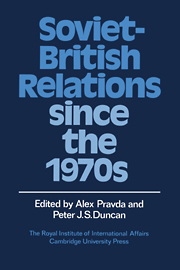Book contents
- Frontmatter
- Contents
- Contributors
- Acknowledgments
- 1 Introduction: pre-perestroika patterns
- 2 The historical perspective
- 3 Soviet perspectives on Britain and British foreign policy
- 4 British perspectives on the Soviet Union
- 5 The security dimension
- 6 Anglo-Soviet relations: political and diplomatic
- 7 The Soviet Union and the Left in Britain
- 8 Anglo-Soviet cultural contacts since 1975
- 9 Trade relations: patterns and prospects
- 10 Doing business with the USSR
- 11 Conclusions: Soviet-British relations under perestroika
- Index
10 - Doing business with the USSR
Published online by Cambridge University Press: 29 October 2009
- Frontmatter
- Contents
- Contributors
- Acknowledgments
- 1 Introduction: pre-perestroika patterns
- 2 The historical perspective
- 3 Soviet perspectives on Britain and British foreign policy
- 4 British perspectives on the Soviet Union
- 5 The security dimension
- 6 Anglo-Soviet relations: political and diplomatic
- 7 The Soviet Union and the Left in Britain
- 8 Anglo-Soviet cultural contacts since 1975
- 9 Trade relations: patterns and prospects
- 10 Doing business with the USSR
- 11 Conclusions: Soviet-British relations under perestroika
- Index
Summary
The intention in this chapter is to examine from a strictly practical perspective the problems facing British companies who wish to penetrate the Soviet market and to make some assessment of the effects of the changes taking place within the Soviet foreign trade system.
In comparison with the early 1970s, when it was the leading trading partner of the USSR, Britain has experienced a relative decline, taking it to ninth place in the early 1980s. Although there has been some improvement in the last three years, it still occupies sixth position.
A number of reasons can be offered for this lack of success. The political climate has frequently been presented as the major cause for this decline. There is a difference of opinion, however, on the significance of political factors. In evidence to the House of Commons Foreign Affairs Committee enquiry into UK-Soviet relations, Dr Norman Wooding of Courtaulds, for instance, claimed that his own company's business, and that of a number of firms with which he was well acquainted, were not adversely affected by the reactions of the West towards Soviet policy in Afghanistan. On the other hand, another witness, Mr Ralph Land of Rank Xerox, considered that in a difficult political climate the total value of business did not grow and frequently declined. One concrete example which he used was the loss by Rank Xerox of a £2 million contract which was ready for signing within a week of the expulsion of 105 diplomats during 1971–72.
- Type
- Chapter
- Information
- Soviet-British Relations since the 1970s , pp. 215 - 231Publisher: Cambridge University PressPrint publication year: 1990

